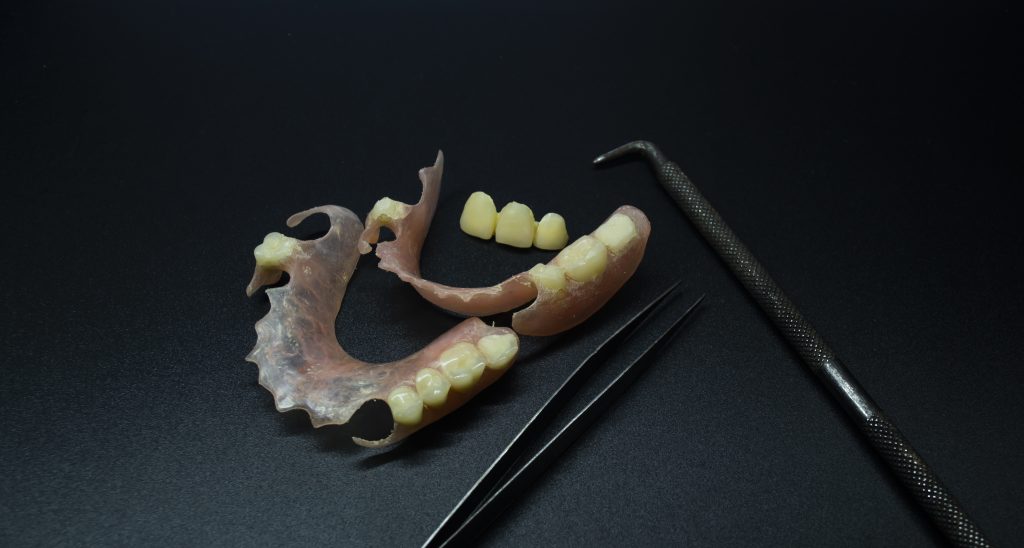
Removable dentures are a genuinely wonderful innovation in dentistry as they allow people to regain the many abilities teeth allow us to do, including speaking, eating and smiling. Advancements in dental technology mean that, nowadays, dentures are easy to use and comfortable most of the time. However, at some point in time, you might find your dentures become somewhat uncomfortable and even slip. This is usually a case of the dentures requiring some slight adjustment.
In this post, we’ll explore the reasons why dentures may be uncomfortable and what your prosthetist can do to remedy the issues caused by ill-fitting dentures. We’ll also explain the process for denture adjustments and relines so you know exactly what may be required for your dentures.
Why Do Dentures Need to be Readjusted & Relined?
First things first, it is crucial to begin by acknowledging that dentures differ between people. We are all different, and as you know, there is no one-size-fits-all denture. While your dentures are tailored to fit your mouth perfectly, they do need to be maintained. An essential part of denture maintenance involves the readjustment and relining of your dentures.
If you find yourself wondering why your removable dentures need to be adjusted from time to time, it is mainly because, like the rest of your body, your mouth changes shape over time, and, as a result, your dentures need to be adjusted to ensure you always experience a comfortable and effective fit. Moreover, ill-fitting dentures can be a breeding ground for infections, which you want to avoid at all costs.
How Do I Know My Dentures Need Adjustments?
Now that you know that it is totally normal to have your dentures adjusted, the next question you’ll probably be asking is when is the right time. Well, that depends on several factors, such as how quickly your mouth changes and how well you maintain your dentures. However, there are some tell-tale signs to keep a close eye on, which will indicate that your dentures do require a little attention.
There’s Damage to Your Dentures
This may seem like a no-brainer, but you’d be surprised. Accidents happen. So whether you drop your dentures or put too much pressure on them, there could be incidents that cause teeth to break. Alternatively, accidents could cause less obvious damage, such as chips or small cracks. While you may be tempted to ignore these seemingly minor faults, they could potentially threaten the function of your dentures, and cause pain and irritation in your mouth. Regardless of the extent of the damage to your dentures, don’t attempt to fix them yourself. Instead, consult your prosthetist to have the denture restored professionally.
You Have Difficult Chewing
One of the primary functions of dentures is to allow the user to regain their regular eating habits. Naturally, when you first get dentures, you’ll take some time to get used to them. However, if you notice that you start to struggle with chewing at a later stage, it could be a sign that the dentures need to be refitted to match the precise shape of your gums.
You Experience Discomfort
Although dentures never quite feel exactly like your natural teeth, they shouldn’t cause any discomfort. If you suddenly feel any form of discomfort, such as jaw soreness or uneven pressure when you chew, or intense pain near the canine teeth, you should consult your prosthetist.
You Have Sore Spots
Pressure sores can be caused by ill-fitting dentures that exert too much pressure on certain parts of the gums. Dentures don’t necessarily cause oral sores, but these can be exacerbated by dentures. If you notice any type of sore spot or experience soft tissue irritation or discolouration, it is a good idea to consult your prosthetist.
You Have Gum Irritation
Although removable dentures take a while to get used to, once you acclimatise to them, they should cause no gum irritation. Keep an eye out for any gum inflammation, raw spots or bleeding. All of these are signs of a defect in the surface of your denture.
You See Changes to the Shape of Your Face
While it is a function most of us take for granted, the fact is our teeth play a significant role in keeping your cheeks looking even. Dentures essentially need to perform the same task in lieu of your natural teeth. So, if you begin to notice any change to the appearance of your jawline or cheeks, it may be a good indication that your dentures need to be adjusted.
Your Denture Fit Changes
A good pair of removable dentures should fit well. This means the top denture should suction smoothly to your gums, and the bottom ones should float just above the gums but stay in the mouth easily. Additionally, partial dentures should fit seamlessly with your natural teeth, and there should be minimal movement. If your dentures don’t fit well or you experience a sudden change in the fit, you should consult your prosthetist and organise for denture adjustments and relines to make the changes needed to alleviate any pain or discomfort.
You Experience Changes to Your Speech
Just like chewing, speech is dependent on your teeth. When you first get dentures, you may experience some changes to your speech patterns, like developing a lisp or experiencing excessive salivation. However, in time these issues should disappear as you get used to having dentures. If they continue, return or you experience any new speech pattern changes, it could be an indication that the dentures need to be adjusted or relined.
What Happens When My Dentures Are Readjusted or Relined?
Denture adjustments and relines are relatively straightforward procedures, but they do differ slightly. Prosthetists can readjust dentures pretty quickly at their offices in order to relieve any minor discomfort and improve fit. It is quite normal for dentures to require a few adjustments at the start and also after some time has passed and your mouth shape has changed. If you experience any of the symptoms discussed above, you should contact your prosthetist.
Relining is more of a maintenance procedure whereby the layer of the denture that rests on your gum tissue is reshaped and replaced using relining resin. This may be required as a result of any general wear and tear or changes in your mouth. Relining is an integral part of the experience of wearing dentures, and it is an inevitable requirement over the lifetime of your dentures. Generally dentures need to be relined as often as every year or two.
What If Readjustments or Relining Doesn’t Solve the Problem?
In most instances, a denture readjustment or reline will do the trick when it comes to an ill-fitting denture. However, there will come a time when these procedures are no longer as effective, and you need to replace the denture entirely. Generally, our mouth changes a fair amount over the course of 5–10 years. You can expect to need to replace your dentures entirely by this point.
In some cases, your prosthetist may be able to use the existing teeth of your dentures and set them on a brand-new base, but, in others, a whole new set of dentures will be required.
At the end of the day, we all want dentures that fit perfectly all the time. If they are loose or aren’t moulded to the contours of your mouth, it can lead to infections and sores. Moreover, you might struggle to chew or talk and, in the worst cases, ill-fitting dentures can damage the function of your jaw muscles. To ensure your dentures always remain fully functional and comfortable, visit your prosthetist regularly and address any of the symptoms discussed here as soon as possible.
How Do Your Dentures Feel?
Are your dentures feeling a little misaligned? Are you looking for help repairing dentures in Perth? Direct Denture Care is here to help! With qualified prosthetists on hand to help create perfectly fitted dentures and provide you with the information about keeping your dentures in tip-top condition for years to come, Direct Denture Care is the specialist service you need. So contact Direct Denture Care today and walk away feeling confident with that smile again!











